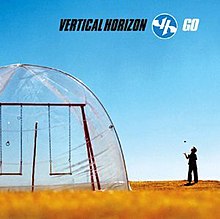Forever (Vertical Horizon song)
| Go | ||||
|---|---|---|---|---|
 |
||||
| Studio album by Vertical Horizon | ||||
| Released | September 23, 2003 June 28, 2005 (re-release) |
|||
| Genre | ||||
| Length | 45:07 | |||
| Label |
RCA Records Hybrid Recordings |
|||
| Producer | John Shanks | |||
| Vertical Horizon chronology | ||||
|
||||
| Singles from Go | ||||
|
||||
| Re-release Cover of Go 2.0 | ||||
 |
||||
| Professional ratings | |
|---|---|
| Review scores | |
| Source | Rating |
| Allmusic | |
| Alternative Addiction | |
| The Daily Star | |
| Collegiate Times | (favorable) |
| Billboard | (favorable) |
Go is the fourth studio album by alternative rock band Vertical Horizon. The album, a follow-up to the band's double platinum Everything You Want, continues to expand upon the band's alternative and pop rock sound while moving into more hard rock directions as well. Recorded in early 2002, the album was ready as early as that August, but was instead delayed extensively due to restructuring at the band's label, RCA Records. The album was released over a year later on September 23, 2003. The first single off the album was "I'm Still Here", and "Forever" was released as the second and last single.
The album was well received by critics, who praised the album for being enjoyable despite not being especially inventive, but did not perform well commercially, with it not charting within the top 60 in its first week, and failing to achieve any RIAA certification. The album was later re-released as Go 2.0 in 2005 on Hybrid Recordings, with a new track "Better When You're Not Here" and rearranged track listing.
After the band's release of their double platinum album Everything You Want in 1999, the band had initially intended to record a follow-up right away. However, the band ended up touring in support of Everything You Want for about two and a half years at request of their label. The band took a break from touring in early 2002 to move to Los Angeles and start recording sessions for Go.
The Go sessions began after commencing the two and a half years of touring in support of Everything You Want in early 2002. Despite the band's origins as a duo where Matthew Scannell and Keith Kane split singing and songwriting duties, the band dynamic shifted to Scannell proving majority of both for Everything You Want, and all of both for Go. The process started with Scannell writing material in solitude, and then presenting his ideas to the rest of the band. How developed song ideas were varied by the track; some, such as "Underwater", was only a loose outline of a song, where as the track "Forever", was almost fully realized. Once ample ideas were in place, the band would enter the rehearsal space, where the band worked on arranging the album, and either expanding or trimming segments of tracks.
...
Wikipedia
